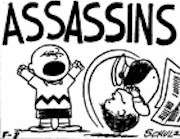How Many Americans Believe a Conspiracy Killed JFK?
How about Bobby Kennedy? Martin Luther King? Vince Foster?

As we approach the 50th anniversary of John F. Kennedy's death, Karlyn Bowman and Andrew Rugg of the American Enterprise Institute have pulled together a very useful paper on the popularity of various conspiracy theories over the last five decades. The authors assembled every poll they could find since 1963 on the JFK, RFK, and MLK assassinations, the Pearl Harbor and 9/11 attacks, Roswell, Oklahoma City, and more -- all sorts of conspiracy stories, from the plausible (a Waco cover-up, Iraq war lies) to the loopy (Holocaust denial, moon landing denial). For many of the topics, several polls have been conducted over the years, allowing the reader to track a theory's popularity over time.
It's a great resource, and it includes several surveys I've never seen before. (I wish I'd had it at hand when I was writing my book about America's conspiracy folklore.) It is also refreshingly reluctant to draw sweeping conclusions about conspiracy believers. "We don't find compelling evidence from the data in this document that particular demographic groups are susceptible to a belief in conspiracy theories," Bowman and Rugg write. "It depends on the theory. Middle-aged Americans are more likely to believe in the JFK assassination conspiracy than older or younger ones. Young people and Democrats are most likely to subscribe to conspiracy theories about 9/11. Women are more likely to believe foul play was involved in Princess Diana's death. While the demographic data presented here are by no means exhaustive, we're hesitant to endorse what much of the literature concludes -- that the young and less educated are more prone to conspiratorial instincts."
The institute also produced a short video to release alongside the paper. I have a few cameos in it:


Show Comments (60)